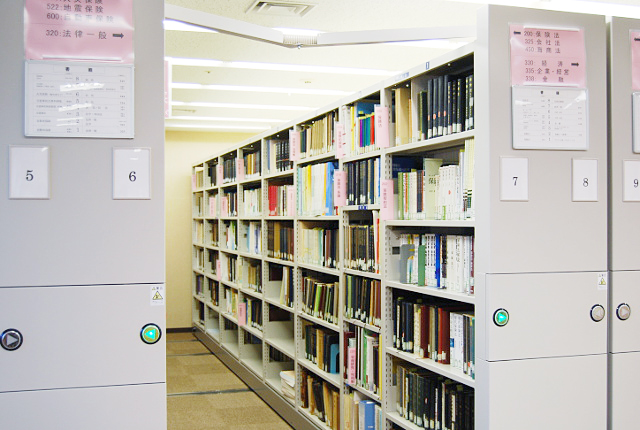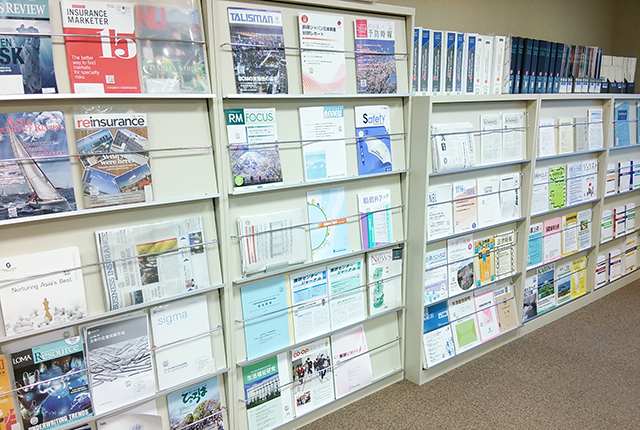EDUCATION
■NON-LIFE INSURANCE EDUCATIONAL COURSES
The institute holds the following courses for the purpose of providing education and training principally to those who are engaged in the non-life insurance business.
Introductory Course
The purpose of the Introductory Course is to provide participants with basic, essential and practical insurance knowledge via eight-hundred repeatable web-based quizzes. This basic knowledge includes insurance theory, insurance laws and regulations (for both non-life and life insurance businesses), and related subjects such as taxation and social insurance. This course is suitable for those who have just begun a career in insurance, or for those interested in learning about the field. In consideration of participant convenience, the course is designed to be accessed and completed anytime/anywhere via mobile devices such as smartphones and tablets. In 2023, 883 people undertook the Introductory Course.
Regular/Basic Course
The institute’s main training course is the one-year Regular Course, which aims to provide in-depth knowledge of non-life insurance theory and practice. It currently consists of 13 subjects, such as Principles of Insurance, Insurance Laws, Risk Management and Financial Science. Initiated in 1953, the Regular Course is mandatory for every managerial career track employee in most insurance companies. Certificates are awarded to participants who complete the course and pass the examinations.
Less extensive than the Regular Course, the Basic Course was initiated in 2011 for employees with limited job scope. Studied over seven months, the course consists of five subjects.
In 2023, while 1,163 people undertook the Regular Course, 82 people undertook the Basic Course. In order to provide educational support to a much wider cross-section of the industry, the courses are now open not only to Japanese and foreign insurers doing business in Japan, but also to cooperatives and intermediaries.
Advanced Course
The Advanced Course was launched in 2014 to provide enhanced underwriting and service skills to mid-level employees. Participants can choose from a selection of ten subjects covering the fields of underwriting, claims, and corporate-management. Each subject consists of two or three in-class lectures, which are also provided online. In 2023, the total number of people who undertook the Advanced Course was 592.
Specific Course
Designed to provide advanced education on specific matters related to non-life insurance and associated fields, Specific Courses cover many different subjects, with each one being comprised of several sessions that are presented at varying intervals during the year. Applicants are free to select subjects depending on their interests and needs. As a measure against the Covid-19 pandemic, every Specific Course in 2022 was provided online rather than in the traditional face-to-face format.
Each Specific Course starts twice a month (on the 1st and 15th), and can be seen and studied for 30 days. In 2023, a total of 329 people attended Specific Courses on 92 subjects.
Special seminars
Special seminars are one-day sessions that provide a broad range of specialized knowledge and information directly and indirectly related to insurance. In 2023, 1,603 people participated in 24 special seminars.
Chosen from among topics which could have an impact on the future of the insurance business, past seminar themes have included:
- Challenging the Protection Gap: A New Paradigm for Insurance
- Embedded Insurance: Current Status and Future Prospects
- Recent Trends and Issues on Laws and Regulations Related to Autonomous Vehicles
The most popular seminar was “Explanation of Fraudulent Claim Cases Abusing Natural Disasters”, which attracted some 122 participants.
■THE INSURANCE SCHOOL (NON-LIFE) OF JAPAN (ISJ)
PUBLICATION
LIBRARY
The library collection accumulated since the foundation of the institute was completely destroyed during World War II. The rebuilding of the library, which started soon after the war, is deeply indebted to Dr. Kotaro Shida, ex-dean of Meiji University, Dr. Zen-ichi Takiya and Dr. Ikusaburo Shiina all of whom made large donations of books. Since that time, the institute has accumulated an extensive collection of works on non-life insurance subjects, as well as legal, economic and other fields.
Currently, the library comprises some 22,200 volumes and 519 periodicals.
The institute’s library is used not only by employees of non-life insurance companies, but also by scholars, students and people from various fields seeking information concerning non-life insurance. Enquiries can be made via the Internet, by telephone or by fax, and library staff will carry out a search and recommend appropriate reading material.
RESEARCH
■RESEARCH ACTIVITIES
The institute conducts extensive research on medium to long-term issues emanating from changes and developments in the economic, social and financial environment surrounding the non-life insurance industry.
The Research Department was set up in July 1990 with the aim of functioning as a think-tank to provide the industry with advice and essential materials for the study of its roles and the direction to take in the new era.
During the 2023 term, studies were conducted on the following two subjects:
- “ The Status of Utilization of Data, Including Personal Identification Numbers, and Efforts to Standardize Operations in the Insurance Industry in Major Countries”
- “ Recent Developments in Insurance Regulation and Supervision in Major Countries - Focus on Solvency Regulation and Business Scope of General Insurers”
In addition to the above studies, the Research Department published quarterly reports on topical subjects, with 6 main themes related to the business of non-life insurance.
PROMOTION OF STUDY
■JUDICIAL CASE STUDY
In April 2008, the institute started a new society for the study of judicial cases in the non-life insurance field, which is comprised of about 50 members from universities, law offices and the non-life insurance industry. Results of the studies are published in the institute’s journal, the “Study of Non-Life Insurance”.”
■SUBSIDIES FOR SCHOLARLY STUDY OF NON-LIFE INSURANCE
In 1972, the institute began offering subsidies to young scholars and graduate students engaged in the study of non-life insurance science for their expenditure on books. In order to expand the range of use to include general research, in 1993, the institute restructured the subsidies offered on condition that any research undertaken is related to non-life insurance. Some 177 beneficiaries received grants between 1972 and 2023.
■COOPERATION WITH RELATED ORGANIZATIONS
The institute serves as the secretariat for the Japanese Society of Insurance Science (JSIS: "Nihon-Hoken-Gakkai") from April 1, 2024 to March 2031. The JSIS was established in November 1940 as a nonprofit organization for the purpose of promoting insurance science in Japan. The JSIS aims to promote research and cooperation in insurance science, and to facilitate interactions and exchanges with related academic societies and organizations in Japan and abroad.





